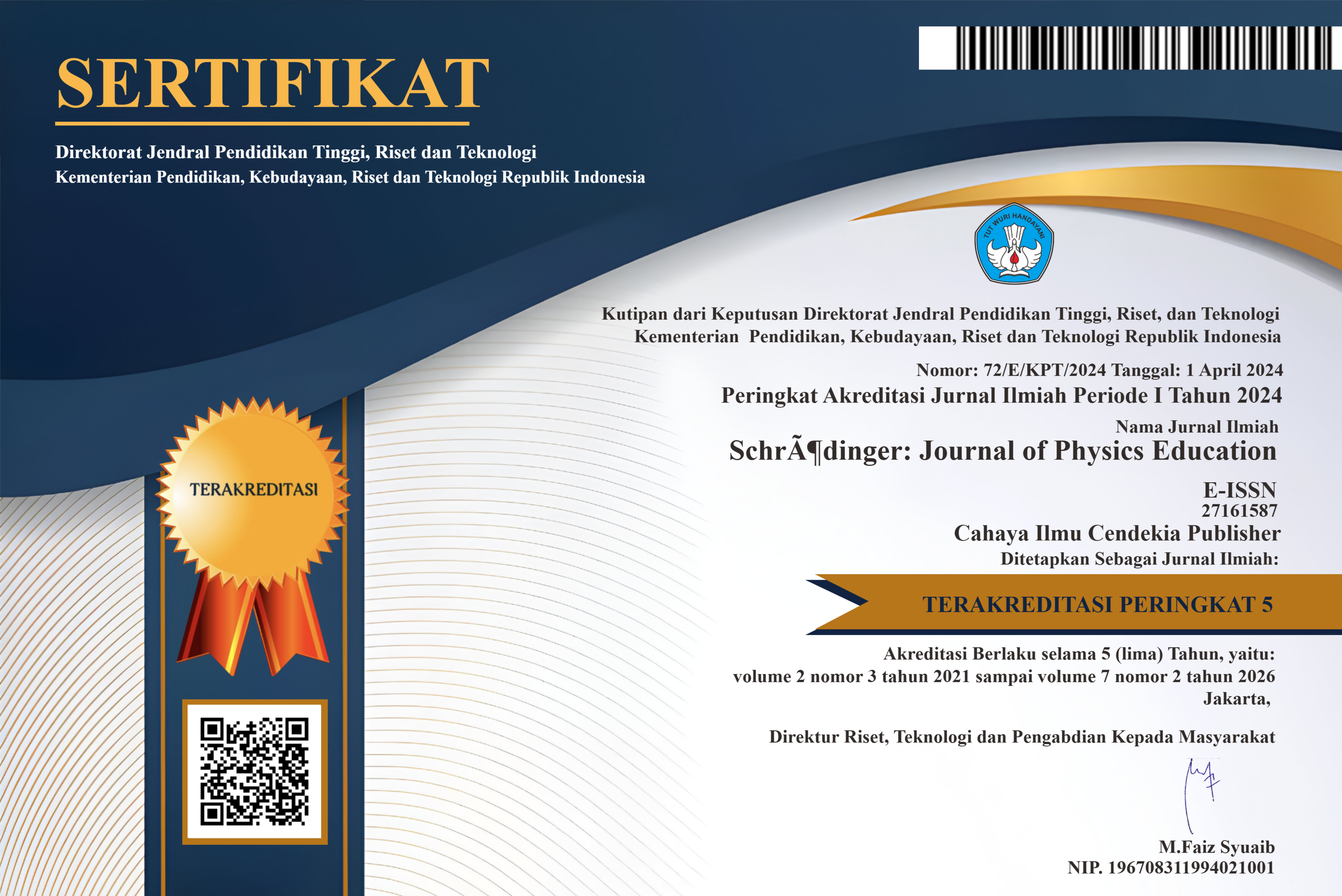A Study of Science Process Skills on Simple Pendulum Materials
Abstract
Research Objectives: The objective of this study was to describe students' science process skills in simple pendulum material.
Methodology: This research method is a mixed research method with a sequential explanatory research design. This research involved 100 students of Al-Falah Jambi Islamic High School. The instruments used were KPS observation sheets with 16 indicators and interview sheets which were analyzed statistically descriptively then analyzed qualitatively to strengthen the quantitative data.
Main Findings: The results of the student KPS indicator were very good, namely on the observation indicator with a percentage of 71% of 100 students, while the results on the KPS indicator with a percentage of 66%. of 100 students namely experimenting skills. The lowest result is the presence of predictive indicators that identify variables, and make hypotheses with a percentage of 45%, 66% and 44%. These results indicate that students have sufficiently mastered several KPS in this simple pendulum material.
Novelty/Original Research: How important it is for an educator to be able to improve students' science process skills so that they not only develop cognitive aspects, but also psychomotor aspects, according to the goals of education.
References
H. Harizon, H. Haryanto, and A. Anisah, “Pengaruh Penerapan Model Pembelajaran Kooperatif Tipe Make-A Match Terhadap Hasil Belajar Siswa pada Materi Larutan Elektrolit dan Nonelektrolit di SMA PGRI 2 Kota Jambi”, jisic, vol. 8, no. 2, pp. 47-56, Dec. 2016.
Maison, Darmaji, D. A. Kurniawan, Astalini, U. P. Dewi, and L. Kartina, “Analysis of science process skills in physics education students”, Jurnal Penelitian dan Evaluasi Pendidikan, vol. 23, no. 2, pp. 197-205, Dec 2019.
M. D. W. Ernawati, H. Haryanto, and S. C. Nababan, “Analisis Penerapan Model Pembelajaran Kooperatif Numbered Head Together (NHT) dan Pengaruhnya Terhadap Hasil Belajar Siswa pada Materi Struktur Atom di Kelas X SMKN 3 Kota Jambi”, jisic, vol. 9, no. 1, pp. 45-53, May 2018.
H. Haryanto, A. Bakar, and M. Alfi Nur Ilahi, “Studi Perbandingan Hasil Belajar pada Materi Tata Nama Senyawa Kimia Antara Model Kooperatif Tipe STAD dengan Jigsaw Kelas X SMA Negeri 3 Kuala Tungkal”, jisic, vol. 7, no. 2, pp. 54-62, Apr. 2018.
Maison, Darmaji, Astalini, D. A. Kurniawan, and P. S. Indrawati, “Science Process Skills and Motivation. Humanities & Social Sciences Reviews, vol. 7, no. 5, pp. 48-56, 2019.
Maison, Syahrial, Syamsurizal, and Tanti, “Learning Environment, Students’ Beliefs, And Self-Regulation In Learning Physics: Structural Equation Modeling”, Journal of Baltic Science Education, vol. 18, no. 3, pp. 389-403, 2019.
Tanti, Jamaluddin, and B. Syefrinando, “Pengaruh Pembelajaran Berbasis Masalah terhadap Beliefs Siswa tentang Fisika dan Pembelajaran Fisika”, Jurnal Ilmiah Pendidikan Fisika Al-Biruni vol. 6, no. 1, pp. 23-36, 2017.
Darmaji, D. A. Kurniawan, H. Parasdila, and Irdianti, “Description of Science Process Skills’ Physics Education Students at Jambi University in Temperature and Heat Materials”, The Educational Review, vol. 2, no. 9, pp. 485-498, 2018.
M. Ubaidillah, “Pengembangan Lkpd Fisika Berbasis Problem Solving Untuk Meningkatkan Keterampilan Proses Sains Dan Keterampilanberpikir Tingkat Tinggi”, Edufisika, vol. 1, no. 2, pp. 09-20, 2016.
Maison, Darmaji, Astalini, D. A. Kurniawan, and P. S. Indrawati, “Science Process Skills and Motivation”, hssr, vol. 7, no. 5, pp. 48-56, Sep. 2019.
Darmaji, Astalini, A. Rahayu, and Maison, “Pengembangan Penuntun Praktikum Fisika Berbasis Keterampilan Proses Sains Menggunakan Model Problem Solving”, EDUSAINS, vol. 10, no. 1, pp. 83-96, 2018.
Darmaji, D. A. Kurniawan, H. Parasdila, and I. Irdianti, “Deskripsi Keterampilan Proses Sains Mahasiswa pada Materi Termodinamika”, Berkalah Ilmiah Pendidikan Fisika, vol. 6, no.3, pp. 345-353, 2018.
Darmaji, Astalini, A. Rahayu, and Maison, “Pengembangan Penuntun Praktikum Fisika Berbasis Keterampilan Proses Sains Menggunakan Model Problem Solving”, EDUSAINS, vol. 10, no.1, pp. 83-96, 2018.
Tanti, Maison, A. Mukminin, Syahrial, A. Habibi, and Syamsurizal, “Exploring The Relationship Between Preservice Science Teachers’beliefs And Self-Regulated Strategies Of Studying Physics: A Structural Equation Model”, Journal of Turkish Science Education, vol. 15, no. 4, pp. 79-92, 2018.
H. Haryanto, H. Harizon, and N. Kumala Ratih, “Pengembangan Instrumen Penilaian Keterampilan Proses dan Sikap Ilmiah pada Materi Termokimia Kelas XI MIA SMA Negeri 10 Kota Jambi”, jisic, vol. 8, no. 1, pp. 50 -62, Jan. 2016.
Wiwin, E. & Kustijono, R. (2018). The use of physics practicum to train science process skills and its effect on scientific attitude of vocational high school students. Journal of Physics, 997, 1-8.
A. Rahayu and D. D. Romadona, “Deskripsi Implikasi Sosial dari Fisika, Sikap Terhadap Penyelidikan dalam Fisika dan Adopsi dari Sikap Ilmiah”, Sch. Jo. Phs. Ed, vol. 1, no. 1, pp. 13-17, Jan. 2020.
J. W. Creswell, Educational Research: Planning, Conducting, and Evaluating Quantitative and Qualitative Research. USA: Pearson, 2012.
Tarjo, Metode Penelitian Sistem 3x Baca. Yogyakarta: Deepublish, 2019.
E. Anggereini, R. S. Budiarti, and M. E. Sanjaya, “The Effect of ICT-based Classwide Peer Tutoring (CWPT) Application and Motivation to Biology Education Student Creativity in ICT Learning”, BIO, vol. 4, no. 2, pp. 105-113, Dec. 2018.
H. Durmaz and S. Mutlu, “The effect of an instructional intervention on elementary students' science process skills”, The Journal of Educational Research, pp. 1-13, 2016.
S. Ozgelen, “Students’ Science Process Skills within a Cognitive Domain Framework”, Eurasia Journal of Mathematics, Science & Technology Education, vol.8, no.4, pp. 283-292, 2012.
H. Harlis and R. S. Budiarti, “Pengembangan Bahan Ajar Praktikum dan Instrumen Penilaian Berbasis Keterampilan Proses Sains pada Mata Kuliah Mikologi Program Studi Pendidikan Biologi Universitas Jambi”, BIO, vol. 3, no. 2, pp. 102 - 112, Dec. 2017.
P. Turiman, J. Omar, A. M. Daud, and K. Osman, “Fostering the 21st century skills through scientific literacy and science process skills”, Procedia-Social and Behavioral Sciences, vol. 5, no. 9, pp. 110-116, 2012.
D. A. Kurniawan and H. Parasdila, “Description of Science Process Skills' Physics Education Students at Jambi University in Temperature and Heat Materials”, The Educational Review, USA, vol. 2, no.9, 485-498, 2018.
E. Sulistiani, R. S. Budiarti, and M. muswita, “Analisis Kemampuan Berpikir Kritis Siswa Lintas Minat Pada Pembelajaran Biologi Kelas X IIS SMA Negeri 11 Kota Jambi”, BIO, vol. 2, no. 1, Dec. 2016.
Copyright (c) 2023 Samijo Samijo, Dinda Desma Romadona

This work is licensed under a Creative Commons Attribution-NonCommercial 4.0 International License.
Authors who publish with this journal agree to the following terms:
- Authors retain copyright and acknowledge that the Schrödinger: Journal of Physics Education is the first publisher licensed under a Creative Commons Attribution 4.0 International License.
- Authors are able to enter into separate, additional contractual arrangements for the non-exclusive distribution of the journal's published version of the work (e.g., post it to an institutional repository or publish it in a book), with an acknowledgment of its initial publication in this journal.
- Authors are permitted and encouraged to post their work online (e.g., in institutional repositories or on their website) prior to and during the submission process, as it can lead to productive exchanges and earlier and greater citation of published work.






.png)
.png)








.png)
.png)
.png)







